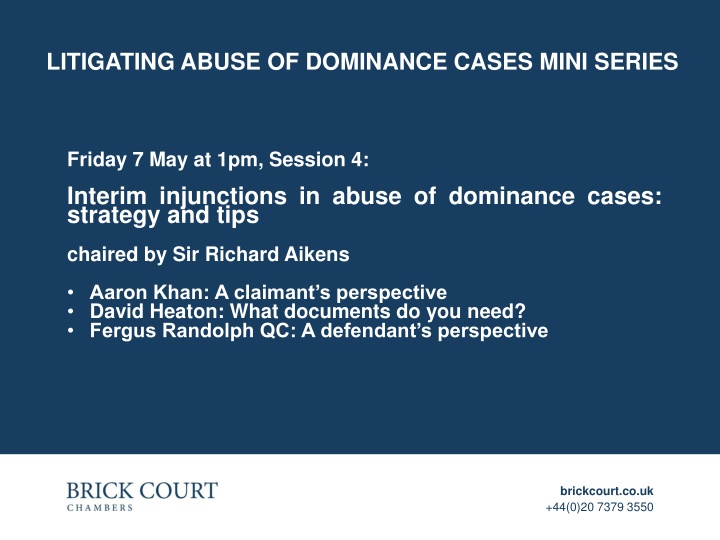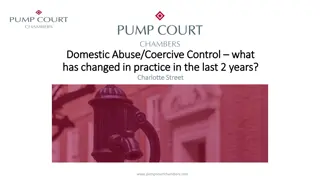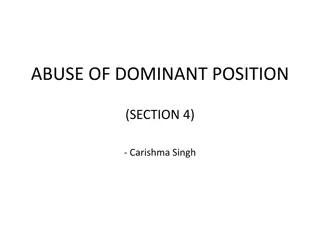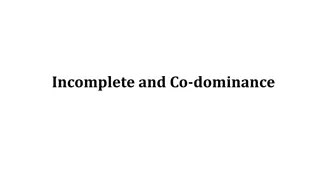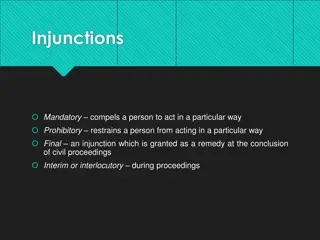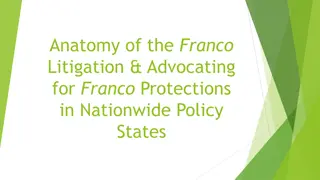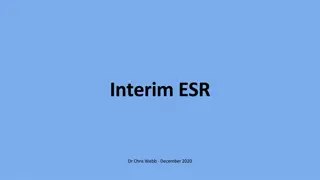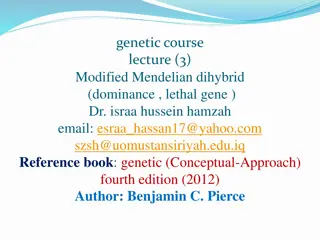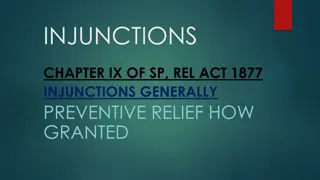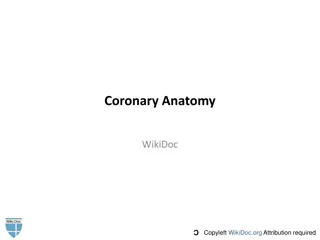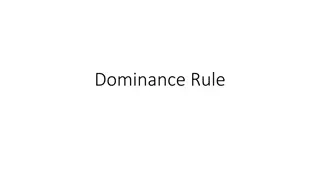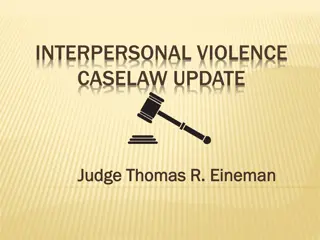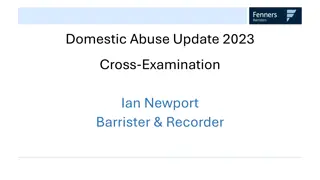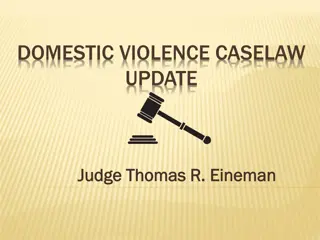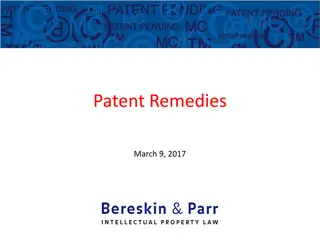Strategies for Interim Injunctions in Abuse of Dominance Cases
This mini-series event focuses on strategies and tips for interim injunctions in abuse of dominance cases, chaired by Sir Richard Aikens. Various perspectives are explored, including a claimant's viewpoint by Aaron Khan, document requirements by David Heaton, and insights from Fergus Randolph QC as a defendant. Key considerations include serious issues for trial, adequacy of damages, balance of convenience, and forum choices for competition claims. The sessions delve into legal nuances, highlighting the complexities involved in obtaining interim relief in such cases.
Download Presentation

Please find below an Image/Link to download the presentation.
The content on the website is provided AS IS for your information and personal use only. It may not be sold, licensed, or shared on other websites without obtaining consent from the author.If you encounter any issues during the download, it is possible that the publisher has removed the file from their server.
You are allowed to download the files provided on this website for personal or commercial use, subject to the condition that they are used lawfully. All files are the property of their respective owners.
The content on the website is provided AS IS for your information and personal use only. It may not be sold, licensed, or shared on other websites without obtaining consent from the author.
E N D
Presentation Transcript
LITIGATING ABUSE OF DOMINANCE CASES MINI SERIES Friday 7 May at 1pm, Session 4: Interim injunctions in abuse of dominance cases: strategy and tips chaired by Sir Richard Aikens Aaron Khan: A claimant s perspective David Heaton: What documents do you need? Fergus Randolph QC: A defendant s perspective brickcourt.co.uk +44(0)20 7379 3550
THE CLAIMANTS PERSPECTIVE AARON KHAN brickcourt.co.uk +44(0)20 7379 3550
Recap: the test(s) to meet Has the Claimant raised a serious issue to be tried? It is no part of the court s function at this stage of the litigation to try to resolve conflicts of evidence on affidavit as to facts on which the claims of either party may ultimately depend nor to decide difficult questions of law which may call for detailed argument and mature considerations. These are matters to be dealt with at the trial (American Cyanamid Co v Ethicon Ltd [1975] AC 396 at p.407, per Lord Diplock). See also Network Multimedia Television Ltd v Jobserve Ltd [2001] EWCA Civ 2021. Would damages be an adequate remedy for each party? Does the balance of convenience lie in favour of granting or refusing an interim injunction? brickcourt.co.uk +44(0)20 7379 3550
Recap: the test(s) to meet (II) Similar considerations apply to mandatory injunctions. The courts may be slower to grant these types of injunctions as they are more intrusive. On an application for a mandatory injunction, the Court may, but will not necessarily, require a higher degree of assurance that the claim(s) are well founded (see, e.g. Zockoll Group Limited v Mercury Communications Limited [1998] FSR 354). Generally, in all cases the Court will consider: which course seems likely to cause the least irremediable prejudice to one party or the other? brickcourt.co.uk +44(0)20 7379 3550
Where? High Court: competition claims must be brought before the High Court (and not the county court). They should be issued in the Chancery Division or the Commercial Court as appropriate. Competition Appeal Tribunal: the CAT has the power to award injunctive relief in England and Wales: s.47A(3) CA 1998; rules 67-68 of the CAT Rules. In deciding whether to grant an injunction, the CAT must apply the same principles as the High Court: s.47D(2) CA 1998. The High Court will be the appropriate forum when running both competition and non-competition claims (see, e.g., Preventx v Royal Mail [2020] EWHC 2276 (Ch)). brickcourt.co.uk +44(0)20 7379 3550
When? An order may be made at any time, including before proceedings have started. In theory an application can be made ex parte, but this is unlikely to be appropriate in competition cases. Normally 3 clear days notice is required. Don t delay this can be a basis for refusing an injunction and undermines the suggestion that interim relief is necessary. brickcourt.co.uk +44(0)20 7379 3550
Practical tips (I) Set out the basis of the claim(s) as fully as is possible: If an injunction is sought before proceedings are issued, it is strongly preferable to provide draft PoC as part of the application documents. This shows credibility/confidence in the claim(s). Courts have not been afraid to scrutinize the claim to ascertain whether it is seriously arguable and refused an injunction on that basis. Consider the reasons why an interim injunction is necessary. Would an expedited trial be sufficient? brickcourt.co.uk +44(0)20 7379 3550
Practical tips (II) Keep the hearing in mind when preparing correspondence consistency is important. Frame the relief sought carefully the Court will prefer to hold the ring rather than imposing new terms, relationships or structures. The relief sought needs to be realistic/workable. Consider whether you need to apply to serve out of the jurisdiction. See Epic Games v Google/Apple [2021] CAT 4. brickcourt.co.uk +44(0)20 7379 3550
WHAT DOCUMENTS AND MATERIALS DO YOU NEED? DAVID HEATON brickcourt.co.uk +44(0)20 7379 3550
LEGAL DOCUMENTS Core documents for any interim injunction application: Application notice Supporting evidence Draft Order (Draft) Particulars of Claim Key points in abuse of dominance cases: Consider precisely what client needs to achieve and language of interim order to do so Application of prohibitory / mandatory distinction in this context Is interim relief required at all? (Would a CAT fast-track trial or an expedited trial be a better strategic option?) brickcourt.co.uk +44(0)20 7379 3550
KEY AREAS FOR EVIDENCE Dominance Abuse Criteria relevant to grant of interim relief: Irremediable harm (not) caused to Claimant if interim relief not granted Irremediable harm (not) caused to Defendant if interim relief granted Balance of convenience Claimant s ability to satisfy undertaking in damages brickcourt.co.uk +44(0)20 7379 3550
EVIDENCE OF DOMINANCE Focus on market definition and market share to get to / above 40% Consider available public sources: eg regulatory reports / decisions, previous court / CAT decisions, market reports Expert report? Can be difficult to gainsay on an interlocutory application but not impossible: see, eg, Packet Media Ltd v Telefonica UK Ltd [2015] EWHC 3273 (Ch) [33]-[34] (John Baldwin QC): I turn first to Mr William s report. One of the two matters he was asked to consider was: Whether there is a seriously arguable case that O2 [Telefonica] is dominant on the market put forward by HHJ Hodge QC. He presents his preliminary assessment of the issue. After having accepted that he has not reviewed the documents relied on by [Telephonica s witness] in detail and having not been shown the defence which includes relevant information about the O2 s business in this field, or any of the evidence filed before HHJ Hodge, which provided the basis for the judge s conclusions, he opines: claims of O2 dominance cannot be soundly dismissed, in my view, without careful detailed regard for relevant and up-to-date market evidence. He goes on to say that he does not believe the evidence provided to-date provides a basis for soundly dismissing the claim, but it is hard to understand how he has reached that belief since he concedes he has not properly reviewed the relevant material. In my judgment, this opinion evidence of Mr Williams is of no value to me at all. brickcourt.co.uk +44(0)20 7379 3550
EVIDENCE OF ABUSE Three key elements to address to establish an abuse Nature of Claimant s business Defendant s role in relation to it (eg supplier/provider of key input) Defendant s abusive conduct (and its effect on Claimant s business) Resist temptation to oversell Claimant s business Set out abusive conduct and effect as precisely as possible (using contemporaneous documents) Interactions between parties often important, including response to pre-action letter (and refusals to provide disclosure) brickcourt.co.uk +44(0)20 7379 3550
EVIDENCE ON INTERIM INJUNCTION CRITERIA Central issue is why can t / can the Claimant wait for trial (ie irreparable harm) Likely overlap with evidence going to abuse and its effect, but Claimant s focus here is on showing harm that cannot be compensated by damages Claimant s evidence should identify (alleged) irreparable harm and demonstrate its extent (eg permanent damage to competitive market structures, loss of customers, reputational harm) if possible, using contemporaneous documents / objective sources Financial harm may be sufficient where the consequence is that the Claimant will itself fail / cease operations if injunction not granted Evidence should also identify (for balance of convenience) all other detriment caused from Claimant s perspective by alleged abuse (eg changes to Claimant s processes/systems that, while reversible, may take weeks/months to put back, financial consequences, adverse quality effects for customers, etc) and from Defendant s perspective by grant of injunction brickcourt.co.uk +44(0)20 7379 3550
CROSS-UNDERTAKING IN DAMAGES Advise clients early about need to give cross-undertaking in damages when an injunction is obtained and consequences if Court ultimately decides that injunction should not have been granted (ie claim fails) consequences will vary greatly Address ability to make good undertaking expressly in evidence attach recent accounts, preferably showing substantial cash/equivalent assets in the jurisdiction Consider, and offer in evidence, fortification if appropriate where the Defendant would have a good arguable case of a sufficient risk that the Claimant might not be able to pay an award of damages under the undertaking: see, eg, Alta Trading UK Ltd v Bosworth [2021] EWHC 1126 (Comm) [17] brickcourt.co.uk +44(0)20 7379 3550
KEY TAKEAWAYS Consider carefully whether an injunction is necessary and makes strategic sense and frame carefully Prepare early and consider early (1) how claim will ultimately be framed, (2) how the requirements for an injunction will be evidenced and (3) whether economic evidence is required at interim stage Direct evidence to key points and substantiate with contemporaneous documents wherever possible be creative in terms of sources, especially in showing irreparable harm brickcourt.co.uk +44(0)20 7379 3550
A DEFENDANTS PERSPECTIVE FERGUS RANDOLPH QC brickcourt.co.uk +44(0)20 7379 3550
OVERVIEW Take every reasonable point It s not illegal to be dominant paint the positive picture Be careful what your client says and check what has already been said Keep open the possibility of mid-course undertakings Competition law is not a general law of fair trading brickcourt.co.uk +44(0)20 7379 3550
BREXIT 2018 European Union (Withdrawal) Act as amended by the 2020 European Union (Withdrawal Agreement) Act 2019 Competition (Amendment etc.) (EU Exit) Regulations Consequential amendments to WB Competition Law Practice Direction /s.47A Competition Act 1998 Article 102 TFEU as foreign law S. 6 2018 EUWA; S.60A Competition Act 1998 Jurisdiction brickcourt.co.uk +44(0)20 7379 3550
SERIOUS ISSUE TO BE TRIED Dominance Abuse Causation brickcourt.co.uk +44(0)20 7379 3550
BALANCE OF CONVENIENCE Status quo ante Prohibitory/mandatory issue brickcourt.co.uk +44(0)20 7379 3550
CONCLUSION Scope for defendants to protect their position, even when dominant Lack of clarity post-Brexit will undoubtedly assist Don t forget: take every reasonable point reasonably! brickcourt.co.uk +44(0)20 7379 3550
LITIGATING ABUSE OF DOMINANCE CASES MINI SERIES Friday 7 May at 1pm, Session 4: Interim injunctions in abuse of dominance cases: strategy and tips chaired by Sir Richard Aikens Aaron Khan: A claimant s perspective David Heaton: What documents do you need? Fergus Randolph QC: A defendant s perspective brickcourt.co.uk +44(0)20 7379 3550
